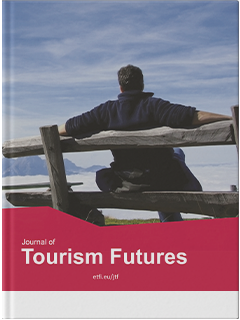Mass tourism, biosecurity and sustainability challenges: prospects illustrated by the current COVID-19 pandemic
IF 5.8
Q1 HOSPITALITY, LEISURE, SPORT & TOURISM
引用次数: 0
Abstract
PurposeUsing COVID-19 pandemic as a more immediate empirical reference, this paper aims to understand the biosecurity risks arising from tourist activities and, through a more prospective analysis, to consider the relevance of public health issues in the context of tourism-sustainability nexuses.Design/methodology/approachThe text assumes a hybrid format, incorporating elements resulting from empirical research and essayistic viewpoints. The collection of empirical elements was based on documental research in several sources, such as newspapers, international institutions of an intergovernmental nature and the discussion forum of the travel platform TripAdvisor.FindingsBy assuming mobility and large agglomerations of people from different origins, mass tourism has fostered multiple outbreaks of COVID-19 and the rapid global spread of contagion chains. The pandemic clearly exemplified the responsibility of tourism in the dispersion of biotic agents with severe ecological, economic, social and public health repercussions. It is, therefore, urgent to rethink the tourism growth trajectory and more effectively consider the biosecurity risks associated with mobility in discussions on tourism and sustainability. At the same time, tourism must be delineated in terms of the great aims of sustainability, and this transversal purpose to which it contributes should be considered an intrinsic condition of its own sectorial sustainability as an economic activity.Originality/valueThe biosecurity challenges posed by mass tourism are a very topical issue, still little considered in sustainability policies and on which there is a marked deficit in scientific research.大众旅游、生物安全和可持续性挑战:当前新冠肺炎大流行的前景
本文以COVID-19大流行为更直接的经验参考,旨在了解旅游活动产生的生物安全风险,并通过更具前瞻性的分析,考虑公共卫生问题在旅游可持续性关系背景下的相关性。设计/方法/方法本文采用混合格式,结合了实证研究和散文式观点的元素。实证元素的收集是基于几个来源的文献研究,如报纸、政府间性质的国际机构和旅游平台TripAdvisor的讨论论坛。通过假设来自不同来源的人员的流动性和大规模聚集,大众旅游促进了COVID-19的多次爆发和传染链的快速全球传播。这场大流行病清楚地表明,旅游业在生物制剂扩散方面负有责任,造成严重的生态、经济、社会和公共卫生影响。因此,迫切需要重新思考旅游业的增长轨迹,并在讨论旅游业和可持续性时更有效地考虑与流动性相关的生物安全风险。与此同时,必须根据可持续性的伟大目标来界定旅游业,它所促成的这种横向目的应被视为其本身作为一种经济活动的部门可持续性的内在条件。创意/价值大众旅游带来的生物安全挑战是一个非常热门的问题,但在可持续性政策中仍然很少考虑,在这方面的科学研究也明显不足。
本文章由计算机程序翻译,如有差异,请以英文原文为准。
求助全文
约1分钟内获得全文
求助全文
来源期刊

Journal of Tourism Futures
HOSPITALITY, LEISURE, SPORT & TOURISM-
CiteScore
15.70
自引率
6.00%
发文量
64
审稿时长
34 weeks
期刊介绍:
 求助内容:
求助内容: 应助结果提醒方式:
应助结果提醒方式:


